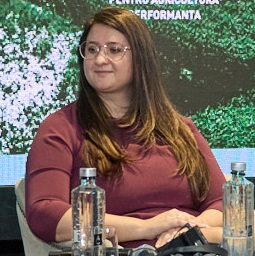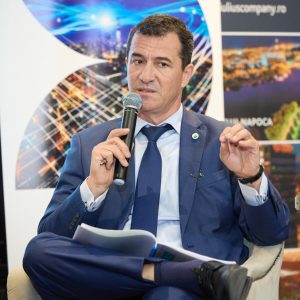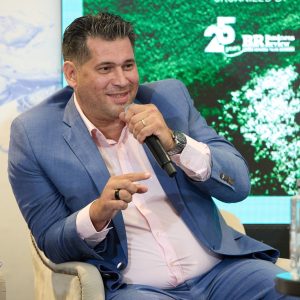The second panel of Environmental & Sustainability Summit 2023, “Food and Water”, brought together agricultural specialists to debate the main issues facing Romanian farmers and producers on the road to sustainable and environmentally friendly agriculture.
Examples of best practices and projects that have already been developed or are under development were presented by those present, who also stressed that Romania’s potential for agriculture is very high, capable of producing food for 80 million people, i.e. much more than today.
Corina Dospinoiu, Sustainability Director, Auchan Romania

”For Auchan, sustainable agriculture is a must-have. A profound transformational element that we must have at the industry level, because for us, it accounts for 95% of the carbon emissions that we have at the company level, and 75% of that 95% comes from the food area. That’s why the impact of agriculture is so big and it’s imperative that we work with the industry and transform the way we produce food so that we combat climate change. Food is vital to us and it is vital that we are not affected in the future by volatility in terms of products or prices. We need pesticide-free food, we need to protect the planet. and this is part of Auchan’s strategy for the future.
Sustainable agriculture, supporting local producers and ensuring we have a short supply chain are addressed through Auchan’s supply chains. We, at group level, are working on a sustainable agriculture policy that we will share with all our partners in agriculture and try to develop. We plan to further develop the Partners for Decarbonization program and integrate concrete action plans with each supplier. Furthermore, we have decided some time ago to discontinue certain products. One of these is Brazilian beef, which we know has an impact on deforestation and climate change. We also don’t sell pangasius, we don’t sell shark. These are just a few examples of what Auchan does for sustainability. Regarding water management, we have adjusted our textile range so that we have organic cotton; normally 2,700 litres of water are used to produce a T-shirt, but only 273 litres of water are used for cotton.
The producers we work with are prepared for all these changes. Everything we’ve built through Auchan’s supply chains has come about through very strong partnerships, which are a great example for the whole industry. I think we have people who are very well prepared and ready to engage in this kind of agriculture and activity.”
Florin Stoica, Sustainability Manager, Carmistin International

”The Carmistin Group is an integrated agricultural group and sustainability is the principle that governs all our activities. Food production must be energy efficient and the environmental impact as low as possible. We have established a strategy to become as sustainable as possible and to integrate as many elements of the circular economy as possible. The strategy is based on three main pillars: the first is the production of green, renewable energy, the second is the efficient use of resources and the elimination of waste, and the third is the acquisition of energy-efficient tools and technology.
The year 2021 was the most problematic year for electricity supply, at one point we could not find suppliers. But we have refocused, and now we are investing in power generation that will ensure our consumption needs. We started these investments in 2012, with two power plants installed on the roofs of farms, with a total capacity of 300 kilowatts, and we finished 2023 with an installed capacity of 5,100 kilowatts in 18 locations of the group. These investments exceeded EUR 3.5 million, and we managed to cover 35% of our consumption. The ultimate goal for us is to become energy independent, i.e. everything we consume should be produced from renewable sources. We have two more projects in the pipeline, namely two gas turbines to produce electricity and heat, and these turbines are designed to use both biogas and hydrogen, and when the infrastructure will allow us to use 100% renewable energy.
In terms of water, it is clear that we need irrigation infrastructure. We have an irrigation project in the Babana-Mizil area, where I am part of an organisation with 17 members, and I can say that we have quite difficult communication. But we will manage to complete the investment, which will serve 1,200 hectares, 700 of which are organic crops. For 500 of these we already have irrigation equipment installed. The project is energy efficient and will have zero water waste from the irrigation canal to the plant.
The Potcoava farm rehabilitation cost EUR 8 million, much of it for more expensive but energy-efficient technology. For example, we have fans with magnet-based technology that consume 35% less energy than a normal fan.”
Florian Ciolacu, Executive Director, Romanian Farmers Club for Performance Agriculture

”In agriculture, all things are good as long as there are farmers. Unfortunately, farmers are now under major pressure from the multiple crises of the last few years: we are talking about COVID, the war in Ukraine, the economic crisis and, above all, climate change. At European Union level, the objectives of sustainable development are contained in the Common Agricultural Policy which distributes money by agricultural area or investment and, complementarily, by what is called the European Ecological Pact. It has several components, one to reduce the distance between farm and consumer and one that deals with pesticide management for the health of the population. Then it has a component looking at integrated water and soil management, as well as one for restoring biodiversity in the soil. All of this must be reflected at the level of a national strategy and further on in programs that compensate farmers for the loss of performance in achieving these objectives. At the Romanian level, as far as the circular economy is concerned, we have an EU average of 12% of the total economy, but in Romania it is less than 2%.
Organic farming has a target of 25% of total EU agriculture by 2030. Austria has already managed to get close to the target, and a number of countries, including France, have well-established programs to reach the target. In Romania, we currently have 580,000 hectares of organic farming, or about 5% of the total agricultural area. There are 12,200 operators working in organic farming, a large number, but on a very small area. Of these, 11,000 are agricultural producers and only 25 are exporters, very few.
In energy, the situation is even more dramatic. An EY study shows that in a group of Central and South-Eastern European countries, Romania’s bio-methane production is 1% of what it could produce. In first place is the Czech Republic with 87%. The neighboring countries have managed to increase bio-methane production through tax incentives, which we did not have.
The solution for the agricultural sector in Romania is integrated water and soil management, irrigation and desiccation, precision farming and digital agriculture, advice and consultancy and investment financing. We know what needs to be done, we know it needs to be done immediately, but it is a question of managing success, not lack of it. In Romania, about 5,000 farms work about a third of the total agricultural area and produce three-quarters of the country’s total output. These farms are the backbone of Romanian agriculture.”
Iuliu Alin Udriste, General Manager of the National Society of Mineral Waters

”In terms of underground mineral water resources, Romania ranks first in Europe. At SNAM, we have the exploitation licences and we sell them to producers, who bottle them. Romania is one of the happiest countries, with enormous mineral water resources. There are three types of water on shop shelves: mineral, table and spring water. Mineral and spring water are not allowed to have chemical intervention and must be microbiologically pure at source. The top four mineral water producers in Romania, or 78% of the total, bottle from us, from SNAM. Our core business is to develop new water sources, through perimeters of development, and to maintain old sources. The market has changed since the 1990s, when mineral water was just carbonated. By law, mineral water is defined as carbonated and still. What we are aiming to do is to develop our own bottling capacity and a national state brand. The plan is to locate a plant at one of the sources, but without distorting the market. We have about 80% of the project already developed, but we are still waiting to finalise the bureaucracy before we start work. We have also largely established the name itself, but I can’t reveal it until the project is ready.
We, work, as a unit of measurement, in litres per second. A normal flow rate is 0.5 or one or two litres per second, but it’s a unit of measurement that we can’t really quantify volume. And we’ve tried to measure it differently: one litre per second means, in 24 hours, three truckloads of two-litre bottles. That’s quite a lot. SNAM acts as a buffer between the private and the state, and we pay around 4 euros per cubic metre royalty to the Romanian state. Since last year, 20% of the royalty goes to the state budget, 45% to the local budget where it is extracted, and 35% to the County Council, which helps the communities a lot.
We have 43 exploitation licenses and we have a list of sources available for exploitation. For these we are looking for partners, companies to come and work with us and help us not to have these free sources. Of course, being a renewable source, it is not lost, but we are not taking advantage of it either. We maintain the sources anyway, but we need partners for bottling and distribution.”


:quality(80)/business-review.eu/wp-content/uploads/2023/10/Small_NEAN0333.jpg)

:quality(80)/business-review.eu/wp-content/uploads/2024/03/Adina-Nanu-Director-Resurse-Umane-si-Transformare-Auchan-Retail-Romania--scaled.jpg)



:quality(80)/business-review.eu/wp-content/uploads/2024/06/22C0420_006.jpg)

:quality(80)/business-review.eu/wp-content/uploads/2024/06/COVER-1-4.jpg)



:quality(50)/business-review.eu/wp-content/uploads/2024/02/SNIPPETS_andrei-anusca.jpg)
:quality(50)/business-review.eu/wp-content/uploads/2023/11/ESS2-1.jpg)
:quality(80)/business-review.eu/wp-content/uploads/2024/06/br-june-2.jpg)
:quality(50)/business-review.eu/wp-content/uploads/2024/07/VGP-Park-Timisoara_-8thbuilding_iulie-24.jpg)
:quality(50)/business-review.eu/wp-content/uploads/2024/07/America-House-Offices-Bucharest-Fortim-Trusted-Advisors.jpg)
:quality(50)/business-review.eu/wp-content/uploads/2024/07/BeFunky-collage-33-scaled.jpg)